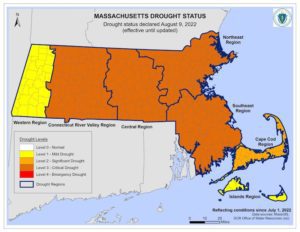Who is a member?
Our members are the local governments of Massachusetts and their elected and appointed leadership.
 Energy and Environmental Affairs Secretary Beth Card gave an update on the state’s Drought Status on Aug. 9, announcing that conditions have deteriorated across the state, with the drought expanding south and westward.
Energy and Environmental Affairs Secretary Beth Card gave an update on the state’s Drought Status on Aug. 9, announcing that conditions have deteriorated across the state, with the drought expanding south and westward.
Card elevated the Connecticut River Valley and Southeast regions to Level 3: Critical Drought, joining the Central and Northeast regions at the second-highest drought level, just one step below Level 4: Emergency Drought.
The Cape Cod Region was elevated to Level 2: Significant Drought, with the Western and Islands regions remaining at Level 1: Mild Drought.
The declarations were the result of recommendations made by the state’s Drought Management Task Force.
Below-average rainfall and above-average temperatures this summer are being felt across the Commonwealth. Decreased water levels in reservoirs, ponds, streams and watersheds lead to higher water temperatures and increased growth of plants and algae. State officials also report that the lack of rainfall and high temperatures are increasing the risk of wildfires, and fire activity has increased across the state. Wildfires in remote areas with delayed response are now burning deep into the organic soil layers.
Watering restrictions outlined in the Massachusetts Drought Management Plan help keep water supplies at safe levels and minimize environmental impacts during periods of stress.
Municipalities in regions designated Level 3 are advised to ban all non-essential outdoor water use. Essential uses for water include health, safety and regulatory uses, as well as for the production of crops, maintenance of livestock and other core business functions.
Municipalities in the Cape Cod Region, now at Level 2, are advised to limit outdoor watering to hand-held hoses or watering cans, before 9 a.m. or after 5 p.m. The Western and Islands regions (Level 1) are advised to limit outdoor watering to one day a week, also before 9 a.m. or after 5 p.m.
Even the mild drought guidance stresses conservation, as conditions could deteriorate further without preventative action.
According to data published by the Massachusetts Department of Environmental Protection on Aug. 16, 168 cities and towns have implemented outdoor water use restrictions, and 156 of these restrictions are mandatory. (For more information, see Outdoor Water Use Restrictions for Cities, Towns, and Golf Courses.)